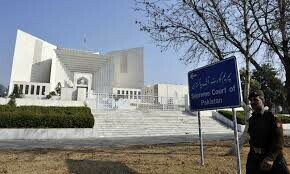ISLAMABAD, Oct 6: The Supreme Court was told here on Monday that the rules framed by the previous Punjab government through a notification, which authorised it to acquire lands in the picturesque village of Salkhaiter, were exclusively meant to benefit a private estate developer to build ‘Bahria Golf City’.
On a suo motu, a three-member bench comprising Chief Justice Abdul Hameed Dogar, Justice Ijazul Hassan and Justice Chaudhry Ejaz Yousaf had taken up a mercy petition regarding the plight of families living in Salkhaiter whose land is being allegedly acquired by the Punjab authorities forcibly to develop a project by Bahria Town.
“These rules were not only inconsistent with the Punjab Local Government Ordinance 2001 but also in conflict with Articles 2A (Objective Resolution to form part of the government), 4 (Right of individual to be dealt in accordance with the law), 9 (security of person) and 26 (non-discrimination in respect of access to public places),” Advocate Shafqat Abbasi argued before the bench while representing the affected people of Salkhaiter, located at the foot of Murree Hills some 15km from the Rawal Dam.
Advocate S.M. Zafar and Ashtar Ausaf represented Bahria Town.
Before the proclamation of emergency and subsequent removal of the apex court judges, a five-member bench headed by now deposed Chief Justice Iftikhar Mohammad Chaudhry had stayed the acquisition of land by the Punjab government for the private-sector development scheme.
Shafqat Abbasi told Dawn that he informed the court that the approval of the Tehsil Municipal Administration (TMA) Murree, a necessary ingredient in developing any project in the area, was missing and so was the public notice by the scrutiny committee of public officers, the job of which was to invite public objections to the project.
Citing the 1994 Supreme Court’s Shehla Zia case, Mr Abbasi requested the court to seek for an expert opinion from professional bodies like the Capital Development Authority (CDA), International Union for Conservation of Nature (IUCN), Sustainable Development Policy Institute (SDPI), National Engineering Services Pakistan (Nespak) or WWF.
According to him, the project was being developed without conducting its environment impact assessment under Section 12 of the Pakistan Environment Protection Act (Pepa) 1997 and alleged that the project could pollute Nullah Korang, a main source of Rawal Dam, the contamination of which could put at risk the health of the citizens.
Salkhaiter is home to over 250 families living in nearly 1,000 houses. According to the villagers, the land was inherited and more than 1,500 individuals depend on the little agricultural produce obtained from fields on the outskirts of the settlement.
In their application to the Supreme Court, the affected residents of the area had accused the Bahria Town proprietors of “forcefully taking over some 659 kanals of land of their forefathers.”















































Dear visitor, the comments section is undergoing an overhaul and will return soon.